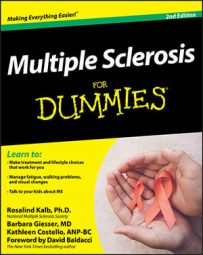Complementary and alternative medicine (CAM) treatments for multiple sclerosis (MS) come in many varieties, including those that are swallowed, injected, infused, or inhaled. For example, take a look at the following:
Bee venom therapy: Bee venom contains proteins that affect the immune system. However, the exact mechanism isn’t known. This therapy can produce rare, but potentially serious adverse effects, including severe allergic reactions and death. A recent clinical trial demonstrated that bee venom is no better than a placebo for treating MS.
Diets and fatty acid supplements: Although many types of diets have been proposed to treat MS over the years, study results regarding diets and fatty acid supplements aren’t conclusive at this time.
Most MS specialist neurologists recommend a balanced diet that’s low in saturated fats and high in fiber and polyunsaturated fatty acids. Some evidence suggests that supplements of omega-6, omega-3, and vitamin E may also be beneficial but the evidence is by no means clear.
Herbs: Herbs should be used with caution by people with MS because some may actually worsen MS or interact with MS medications. The message concerning herbs and MS is similar to that for unconventional medicine and MS as a whole: Some of them may be beneficial, some may be harmful, and nearly all have yet to be fully understood. Having said that, consider the following:
Herbs that may be of benefit for certain MS-specific symptoms include kava kava for anxiety, valerian for insomnia, cranberry for preventing urinary tract infections, and psyllium for constipation.
Herbs to avoid because they stimulate the immune system (which is already overactive in MS) include alfalfa, arnica, astragalus, boneset, calendula, cat’s claw, celandine, drosera, echinacea, garlic (don’t worry — a little in your pasta is okay), Asian and Siberian ginseng, licorice, mistletoe, reishi mushroom, saw palmetto, shiitake mushroom, and stinging nettle.
Homeopathy: Homeopathy, a system of medicine that was developed in the 1800s, is a low-risk, low-to-moderate-cost therapy with unproven effectiveness in MS. It shouldn’t be used in place of conventional medications for controlling disease activity.
Hyperbaric oxygen: This form of oxygen therapy increases the oxygen content of the blood and tissues of the body. Studies have repeatedly demonstrated that hyperbaric oxygen isn’t an effective treatment for MS.
Low-dose naltrexone (LDN): Naltrexone is approved in the United States for the treatment of alcohol and opioid addictions. Some doctors are prescribing it at much lower doses for the treatment of several diseases, including MS and other autoimmune conditions.
LDN was shown to have some benefit on disease activity in a recent study of LDN in experimental autoimmune encephalomyelitis (EAE, an animal model of MS), but it’s a very long way from mouse studies to proving the effectiveness of LDN in people. A small, placebo-controlled study in people with MS demonstrated an improvement in emotional quality of life. More work needs to be done to determine what role LDN might have in MS treatment.
Marijuana: Marijuana is touted for reduction of pain and spasticity. However, its use, in addition to being illegal in the United States, is associated with significant side effects. In a recent, well-designed study, people with MS who regularly smoked marijuana performed significantly less well on several measures of cognitive function and were twice as likely as nonusers to be considered cognitively impaired.
The study confirmed for the first time that cannabis can worsen cognitive problems in MS. In addition, the possible interactions of marijuana with prescription medications aren’t well understood. Research studies are under way to determine whether various chemical components of marijuana can safely reduce neurologic pain and spasticity in MS, and whether they can slow disease activity.
Tetrahydrocannabinol (THC) has been studied with mixed results for the treatment of spasticity and tremor in MS. Sativex, an oral spray derived from marijuana, is now approved in Canada and New Zealand as an add-on (complementary) treatment for MS spasticity and in Canada to treat neurologic pain caused by MS. Sativex is not approved in the United States.
Vitamins and other supplements: People with MS should be cautious with vitamin supplements because they, like other forms of CAM, are a mixed bag of goodies. For example, consider the following findings:
Antioxidant vitamins (A, C, and E) offer possible benefits (by decreasing the harmful effects of free radicals that are involved in the damage to your myelin and axons) and pose possible risks (by stimulating the already overactive immune system).
Vitamin C doesn’t appear to be effective for the prevention or treatment of urinary tract infections.
Vitamin B6 is tricky; too little B6 can interfere with normal nervous system functioning whereas too much B6 harms the nervous system and can actually cause MS-like symptoms.
A small subgroup of people with MS may have a vitamin B12 deficiency and should be treated with vitamin B12 supplements. Your doctor can measure the amount of B12 in your blood to determine whether your vitamin B12 level is deficient.
People who take higher amounts of vitamin D may have a reduced risk of developing MS. And preliminary research suggests that vitamin D may also help slow disease progression in MS. However, taking too much vitamin D can damage your liver. Researchers are working to determine the optimal vitamin D level for people with and without MS.
Vitamin D helps to maintain healthy bones by increasing the body’s absorption of calcium. Sufficient quantities of vitamin D and calcium are essential for preventing osteoporosis (bone loss).
Calcium EAP (calcium-2-aminoethylphosphate — also known as calcium orotate) is a compound developed by Dr. Hans Nieper in the 1960s. It’s very expensive and its safety and efficacy in MS have never been evaluated in a controlled clinical trial.
Selenium, zinc, DHEA (dehydroepiandrosterone), and melatonin may all activate the immune system and should therefore be used in low doses or not at all.

